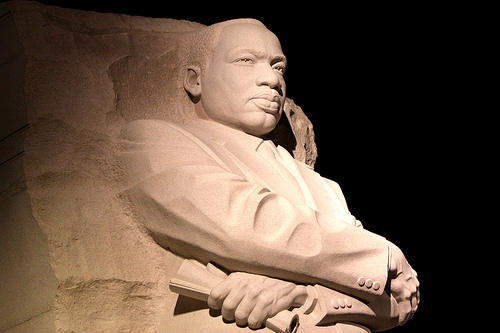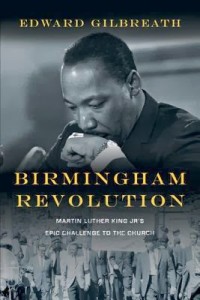 In 1979, a group of African American theologians proposed that it be added to the New Testament. The anti-apartheid movement in South Africa was inspired by its message. And yet few American evangelicals have actually read it. Most haven’t even heard of it. Particularly white Christians.
In 1979, a group of African American theologians proposed that it be added to the New Testament. The anti-apartheid movement in South Africa was inspired by its message. And yet few American evangelicals have actually read it. Most haven’t even heard of it. Particularly white Christians.
In his brilliant book Birmingham Revolution, author Edward Gilbreath introduced me to the epistle I’ve never read – Dr. Martin Luther King Jr.’s Letter from a Birmingham Jail.
 In early 1963, seven pastors and a rabbi from Birmingham Alabama joined forces to publicly rebuke Dr. King. They were unhappy with non-violent demonstrations King and his colleagues were leading against segregation in their city. Their joint statement published in both of the city’s newspapers called the peaceful actions “extreme measures” and “unwise and untimely”. The clergy urged citizens to withdraw their support and lean on the courts to remedy racial problems. On top of that, Gilbreath points out that some black leaders also opposed King’s actions in Birmingham. Time magazine described the demonstrations as “poorly timed protests.” The New York Times said King and his colleagues should exercise more patience. President Kennedy urged him to wait. Billy Graham called on King to “put the brakes on a little bit.” (pgs. 77-78)
In early 1963, seven pastors and a rabbi from Birmingham Alabama joined forces to publicly rebuke Dr. King. They were unhappy with non-violent demonstrations King and his colleagues were leading against segregation in their city. Their joint statement published in both of the city’s newspapers called the peaceful actions “extreme measures” and “unwise and untimely”. The clergy urged citizens to withdraw their support and lean on the courts to remedy racial problems. On top of that, Gilbreath points out that some black leaders also opposed King’s actions in Birmingham. Time magazine described the demonstrations as “poorly timed protests.” The New York Times said King and his colleagues should exercise more patience. President Kennedy urged him to wait. Billy Graham called on King to “put the brakes on a little bit.” (pgs. 77-78)
History would prove them all wrong. Shortly after Dr. King penned this jail cell epistle, the world watched in horror as Birmingham police attacked children with dogs and fire hoses during peaceful protests.
Gratefully, Dr. King ignored these high profile critics and listened to God. He wrote, “We have waited for more than 340 years for our constitutional and God given rights.” That was long enough.
Edward Gilbreath’s writing is part history and part personal reflection. But it’s also a bold challenge to the church to reexamine the legacy of Dr. King, and continue his unfinished work in our culture today. I walked away from the book most impacted by the following ideas:
- The Civil Rights Movement was first and foremost a movement of the church. History books and white churches would innocently have you believe that it was a social and political undertaking. The truth is that its leaders were pastors. Meetings were held in churches. Before marching, there were prayers, sermons, hymns and offering. This reality is striking, and should serve as a powerful convicting force for the church today.
- “I Have a Dream” wasn’t Dr. King’s best work. His most memorable speech may have been “I Have a Dream”, but his most important work was Letter from a Birmingham Jail. He secretly wrote this masterpiece on scraps of paper while in solitary confinement. With no notes or books to draw from, he expertly quoted Scripture. He referenced Augustine, Thomas Aquinas, T.S. Elliot, Jefferson, Lincoln and others. Even though he was alone in that cell, King later proclaimed that “God had been my cellmate.” (p. 118) I wholeheartedly believe him.
- Think twice before criticizing Dr. King’s theological training. Many conservative evangelicals have avoided viewing King as someone with something to say about the Christian faith. Why? Because he attended liberal seminaries (Boston University and Crozer Seminary). We’ll never know for sure why King chose those particular schools, but remind me again which conservative seminaries were accepting African Americans in the late 1940’s? Good luck finding one. It’s interesting to note that well known pastor Dr. Tony Evans was the first African American to earn a doctoral degree from Dallas Theological Seminary. He graduated in 1982.
- God worked powerfully through Dr. Martin Luther King Jr. In spite
of the fact that he’s been turned into a mythical secular superhero, he
was a flawed human being. Gilbreath rightly points out that King
experienced the same human emotions and problems as the rest of us. He
got angry. He suffered from insomnia. He joked. He had moral failures.
He was a sinner. But his Letter from a Birmingham Jail leaves no doubt that God worked powerfully through Dr. Martin Luther King Jr. - The church needs to take-up the Civil Rights Movement today. Edward Gilbreath poignantly illustrates that while progress has been made, Dr. King’s work is unfinished. America still suffers from racism. The church continues to be segregated, and true racial reconciliation among believers remains out of reach. Blacks and whites both have a part to play. I stand with Gilbreath in hoping that Dr. King’s inspired writing can call the church today to change. I’m convinced that influential white evangelicals have a responsibility to simultaneously lead the effort, and yield to black clergy and theologians.
Lord willing, followers of Jesus in America can all embrace God’s work through Dr. King, and endeavor to achieve racial justice and unity. May we all accept what Edward Gilbreath calls Dr. King’s “Epic challenge to the church“.
photo credit: Gage Skidmore Martin Luther King, Jr. memorial via photopin(license)
“In 1979, a group of African American theologians proposed that it (“Letters”) be added to the New Testament.” Do you think it’s arrogant that theologians would entertain something that violates God’s commands not to modify His word in *any* way? God’s word is incomplete? Can be improved upon? How so? (rhetorical questions, Brian). Where can I read more about this attempt, on behalf of King?
Judy-
You ask some interesting questions. I discovered that fact in Edward Gilbreath’s book “Birmingham Revolution.” As best as I can recall, he used that tidbit as a means to emphasize the importance of King’s “Letter from a Birmingham Jail” for Christians. If someone were to make that bold of a proposal, perhaps it’s something worth reading? I don’t have any helpful commentary to add regarding their proposal, but I can confidently share that reading “Letter from a Birmingham Jail” was a transformative experience for me. I’d highly recommend it to any Christian who hasn’t interacted with it yet.
Thanks for responding, Brian. I haven’t read “Birmingham Revolution” yet, and I know that you’ve introduced conversation about Dr. King’s “Letter From a Birmingham Jail” on at least two (WCRF) programs. I’ll make a point of starting with Gilbreath’s writing, while withholding a knee-jerk opinion that it was, or is, arrogant to suggest “Letters” be bolted on to the Bible. You’ve put it into context. Regards, Judy
Sounds like a great plan! Gilbreath’s book gives great context to the circumstances that motivated King to write his famous letter. Hope you find it meaningful!